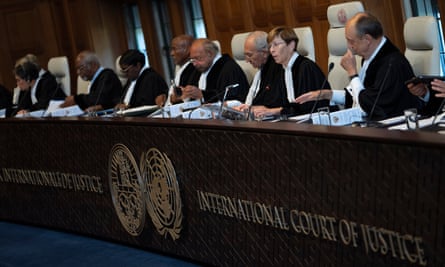The international court of justice has been asked by South Africa to take action and prevent Israel from potentially committing genocide. This request, which includes a demand for a cessation of combat operations, has become suddenly urgent and significant, even though it may have seemed unlikely just two weeks ago.
Crack legal teams are being assembled, countries are issuing statements in support of South Africa, and Israel has said it will defend itself in court, reversing a decades-old policy of boycotting the UN’s top court and its 15 elected judges.
On January 11 and 12, the initial court session in The Hague will take place. Based on past cases, it is feasible that the ICJ will release a temporary decision within a few weeks, possibly while the Israeli assaults on Gaza are ongoing.
The process of global justice, particularly interim justice, does not always move at a slow pace.
South Africa’s request for a provisional ruling is in line with a broader trend at the ICJ for such rulings. Parties have been seeking – and obtaining – provisional measures with increasing frequency: in the last decade the court has indicated provisional measures in 11 cases, compared with 10 in the first 50 years of the court’s existence (1945-1995).
Similar to temporary court orders, provisional measures from the International Court of Justice (ICJ) aim to maintain the current legal circumstances between parties in order to uphold the validity of a final decision in the future. There was initially uncertainty about whether these measures were considered binding by the ICJ. However, in the LaGrand case ruling in June 2001, the court clarified that these measures are indeed binding, as it falls within the court’s fundamental role of resolving international conflicts.
Are they meant to be legally enforceable, or are they actually enforced?
According to a report from American lawyer Mattei Alexianu, only half of the state parties were found to have followed the court’s measures in a particular assessment. In cases that received significant attention, such as Ukraine v Russia in 2022, the Gambia’s accusations of genocide against Myanmar in 2020, the dispute over Nagorno-Karabakh, and the US sanctions imposed on Iran, the state party that lost the case chose to disregard the court’s decision.
It is not surprising that countries were less willing to comply with rulings that were deemed to be intrusive to their sense of national sovereignty.
Ignoring the question of whether or not Israel would follow a potential ICJ ruling to alter its military strategies and abstain from any actions considered genocide, the potential negative impact on Israel’s reputation would be significant. At the very least, it could lead to changes in their military operations. The fact that Israel has opted to defend itself at the ICJ, which is a United Nations-backed organization, and is a member of the genocide convention, makes it more challenging for them to dismiss an unfavorable decision.

This action taken by Israel carries a high level of risk. What is the likelihood of a negative outcome?
Initially, it must be acknowledged that while the South African petition to the International Court of Justice may have appeared sudden on December 29th, it was not a hastily put together effort by their legal team amidst holiday preparations.
The document is a comprehensive and well-supported 80-page statement, filled with specific mentions of high-ranking UN officials and reports. It mostly remains focused on its main objective of proving that Israel had intent to commit genocide. The legal representatives that South Africa is sending to The Hague are highly skilled. A significant portion of South Africa’s argument is based on the 2020 ruling of the International Court of Justice in the Gambia v Myanmar case.
The application states that Israel’s actions and failures to act are considered genocidal because they are intentionally trying to destroy Palestinians in Gaza as part of the larger Palestinian national, racial, and ethnic group. It also claims that Israel, through its government bodies, agents, and others acting on its instruction or under its control or influence, is violating its obligations under the genocide convention in regards to Palestinians in Gaza.
Instead of seeking a final decision, South Africa can request temporary relief under article 74 of the court. This may lower the burden of proof and potentially address some of the initial jurisdictional challenges that the court faces.
South Africa maintains that the court is not obligated to determine if Israel has violated its obligations under the genocide convention.
“Crucially, the court has previously stated that determining the existence of an intent to destroy the Palestinian group, either in whole or in part, can only be done during the examination of the merits of the current case.”
At the stage of making an order for provisional measures, the court’s responsibility is to determine if the alleged actions could potentially be categorized as genocide under the guidelines of the genocide convention.
The court is not required to find that every action being complained about can be classified under the convention. It is enough that “some of the alleged actions…can potentially fall under the convention’s provisions.”
Similarly, the court is not obligated to determine if the presence of a genocidal intent is the sole conclusion that can be drawn from the evidence presented, as this would involve the court making a decision on the substance of the case.
South Africa aims to demonstrate that Israel’s actions extend beyond self-defense and constitute the destruction of the Palestinian people.
The statement outlines the well-known, yet alarming number of deaths, forced relocation, lack of access to food, and limitations on reproduction due to assaults on medical facilities, which provide strong indication of potential genocidal motives.
The statement also includes two additional factors: the extent to which Palestinian cultural activities have been deliberately attacked, and the extent to which Israeli officials have openly called for the annihilation not only of Hamas, but of all Palestinians.
The country of South Africa provides evidence of several instances where Israeli government officials have directly and publicly encouraged acts of genocide. These include statements from the prime minister, Benjamin Netanyahu, about making Gaza uninhabitable and referring to Palestinians as inhuman. The claim also documents calls from far-right ministers Bezalel Smotrich and Itamar Ben Gvir to relocate Palestinians outside of Gaza.
Former officials within Israel have composed a letter addressed to the attorney general, Gali Baharav-Miara, urging for measures to be taken against public officials and elected politicians who have advocated for ethnic cleansing. The individuals who have signed this letter include former ambassador Dr. Alon Liel, Professor Eli Barnavi, Ilan Baruch, and Suzie Bachar.
They declare that the open incitements to commit horrific acts against millions of individuals have now, for the first time in our memory, been accepted as a normal and acceptable aspect of Israeli discourse.
This type of proof, potentially stemming from a recent shift in Israeli attitudes towards the feasibility of peace, could influence judges to conclude that Israel views its safety as contingent on the displacement of Palestinians from Gaza. However, there have been numerous declarations from Israeli authorities contradicting this perspective, which the court must take into account. The hesitation of the Netanyahu administration, partially due to domestic political considerations, to disclose its strategies for the future further complicates the court’s duty to determine Israel’s collective intent.
During an impressive display of rhetoric, Israel’s representative Eylon Levy outlined their plan of action on Tuesday, highlighting their justification for self-defense and the unique methods implemented to minimize harm to civilians.
However, he began by questioning the legitimacy of South Africa’s conflict with Israel and casting doubt on the country’s stance against genocide, citing their support for former Sudanese president Omar al-Bashir during the Darfur crisis. He argued that South Africa was actually acting as an advocate for Hamas, a genocidal group, without compensation.
In order to defend itself against this accusation, South Africa has condemned Hamas for the violent incident on October 7th and has also sent a written notice to Israel beforehand. However, Israel did not respond to the notice. Both nations have agreed to the 1948 genocide convention, which requires them to abide by the decisions of the ICJ in regards to upholding the convention.
The statement made by Levy was that Israel had implemented unprecedented actions in the history of warfare in order to reduce civilian casualties.
We have made it evident through our actions and words that we are focusing on eliminating the threats on October 7 and are finding new ways to uphold international laws, such as proportionality, precaution, and distinction, in the unique setting of a counter-terrorism battlefield that no army has encountered before.
Due to this reason, we spent several weeks encouraging individuals living in the northern region of Gaza to leave before the ground attack. In order to alert civilians, we made over 70,000 phone calls, sent 13 million text messages, left 14 million voice messages, and distributed almost 7 million leaflets, all urging them to temporarily evacuate for their own safety. We also provided information about humanitarian breaks and specific routes for evacuation.
We have taken measures to ensure the safety of civilians caught in the conflict with Hamas. We have established escape routes for civilians to leave areas controlled by Hamas, created hotlines for Palestinian civilians to report instances of Hamas preventing their escape, and designated a specific area in Gaza, where Hamas is using civilians as shields, as a safe zone for humanitarian aid.
“The Hamas rapist machine bears full moral responsibility for all the casualties in this war that it launched on 7 October and is waging inside and under schools, mosques, homes and UN facilities.”
The effectiveness of South Africa’s precautionary measures can be seen as mostly for show, and possibly intentionally ineffective. However, the court may struggle to hold Israel accountable for the “crime of crimes” due to the lack of mention of Hamas fighters using civilians as cover and Israel’s right to defend itself.
Source: theguardian.com


















